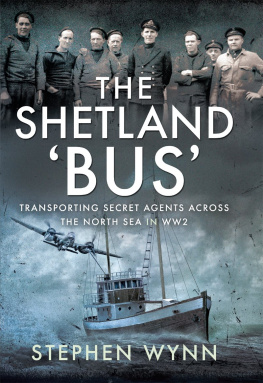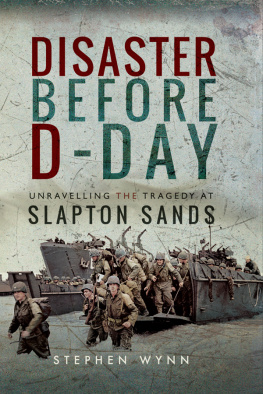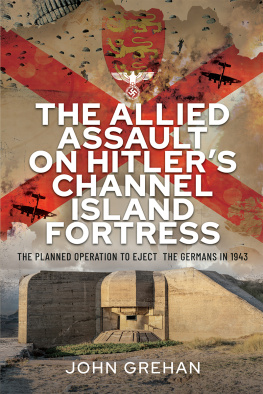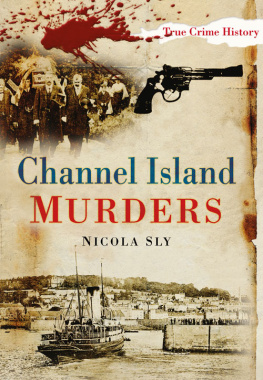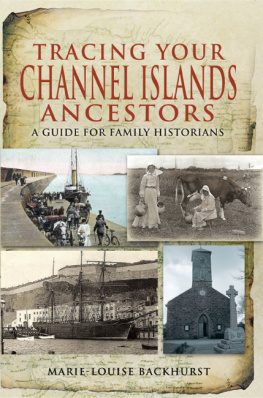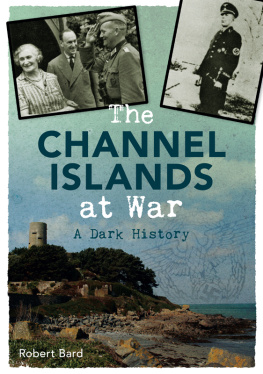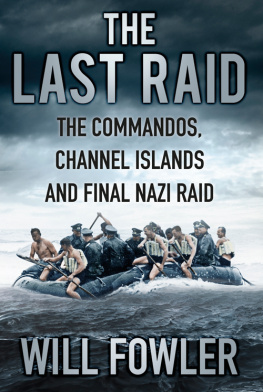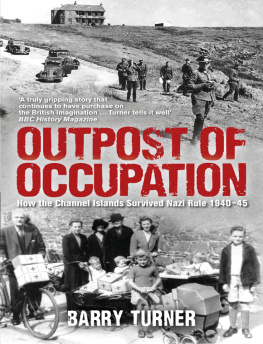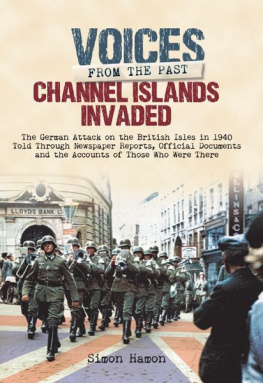THE CHANNEL ISLANDS IN THE GREAT WAR
About the Author
Stephen is a retired Police officer having served with Essex Police as a constable for thirty years between 1983 and 2013. He is married to Tanya who is also his writing partner.
Stephens sons, Luke and Ross, were members of the armed forces, collectively serving five tours of Afghanistan between 2008 and 2013. Both were injured on their first tour which led to his first book, Two Sons in a Warzone Afghanistan: The True Story of a Fathers Conflict , which was published in October 2010.
Both of Stephens grandfathers served during, and survived, the First World War, one with the Royal Irish Rifles, the other in the Mercantile Marine, whilst his father was a member of the Royal Army Ordnance Corps during the Second World War.
Stephen collaborated with one of his writing partners, Ken Porter, on a book published in August 2012, German POW Camp 266 Langdon Hills which spent six weeks as the number one best-selling book in Waterstones, Basildon between March and April 2013. They have also collaborated on four books in the Towns and Cities in the Great War series by Pen and Sword. Stephen has also written other titles for the same series of books and in February 2017, The Surrender of Singapore Three Years of Hell 1942-45 , was published. In addition he has written three crime thrillers, published between 2010 and 2012, which centre around a fictional detective named Terry Danvers.
When they are not writing, Stephen and Tanya enjoy walking their four German Shepherd dogs early each morning when most sensible people are still asleep.
YOUR TOWNS & CITIES IN THE GREAT WAR
THE CHANNEL ISLANDS IN THE GREAT WAR
STEPHEN WYNN
First published in Great Britain in 2019 by
Pen & Sword Military
An imprint of
Pen & Sword Books Limited
Yorkshire - Philadelphia
Copyright Stephen Wynn, 2019
ISBN 978 1 78346 330 5
eISBN 978 1 47386 526 6
Mobi ISBN 978 1 47386 525 9
The right of Stephen Wynn to be identified as Author of this work has been asserted by him in accordance with the Copyright, Designs and Patents Act 1988.
A CIP catalogue record for this book is available from the British Library
All rights reserved. No part of this book may be reproduced or transmitted in any form or by any means, electronic or mechanical including photocopying, recording or by any information storage and retrieval system, without permission from the Publisher in writing.
Pen & Sword Books Limited incorporates the imprints of Atlas,
Archaeology, Aviation, Discovery, Family History, Fiction, History, Maritime,
Military, Military Classics, Politics, Select, Transport, True Crime, Air World,
Frontline Publishing, Leo Cooper, Remember When, Seaforth Publishing,
The Praetorian Press, Wharncliffe Local History, Wharncliffe Transport,
Wharncliffe True Crime and White Owl.
For a complete list of Pen & Sword titles please contact
PEN & SWORD BOOKS LIMITED
47 Church Street, Barnsley, South Yorkshire S70 2AS, United Kingdom
E-mail:
Website: www.pen-and-sword.co.uk
Or
PEN AND SWORD BOOKS
1950 Lawrence Rd, Havertown, PA 19083, USA
E-mail:
Website: www.penandswordbooks.com
Introduction
The Channel Islands are made up of a total of twenty separate islands or islets, of which only seven are permanently inhabited. The main two, which also have the largest populations, are Jersey, with a population of 100,000, followed by Guernsey, which has 63,000 residents. Then comes Alderney, with 2,000, and Sark with just 600. The three other islands are Herm, Jethou and Brecqhou.
Geographically the islands are much closer to mainland France than they are to England and they have not always been under British sovereignty. The remnants of the ancient Duchy of Normandy, they are not part of the United Kingdom but Crown Dependencies, self-governing possessions of the British Crown. As such the people of the islands are British citizens by right but British Acts of Parliament do not automatically extend to the islands as law. This can only take place by what is known as an Order of Council, and then only after consultation with the individual islands primary legislature, known as the States which governs each of the islands.
When the United Kingdom chose to join the European Economic Community on 1 January 1973, the Channel Islands did not follow suit, choosing instead to remain outside.
It is well documented that the Channel Islands were occupied during the Second World War by some 10,000 invading German soldiers, but what is not so widely known is that there were also German soldiers in the Channel Islands during the First World War as hundreds of prisoners of war. The camp which housed these men was situated at Les Blanches Banques on the island of Jersey.
During the First World War, many men from the islands left for England and served with numerous regiments of the British Army, whilst others enlisted closer to home with local units such as the Royal Guernsey Light Infantry and the Royal Guernsey Artillery. Men from Sark and Alderney are also included in this equation. The sacrifice made by the Channel Islands in the First World War, wasnt just down to the men from the bigger and possibly better-known islands of Guernsey and Jersey.
Approximately 3,000 men from Guernsey served in the military during the First World War, with an estimated 1,500, or 50 per cent of them, not returning home after the war. Some 1,000 of the Guernsey men who served, did so with the Royal Guernsey Light Infantry.
Regardless of which regiment or corps men enlisted in, approximately 6,000 of them left the Island of Jersey during the First World War to join the military, and of those, an estimated 862, or 14.5 per cent of them, never returned. So many families lost loved ones that they would never see again, sons, husbands, uncles, cousins, nephews, brothers and fathers. For many, all they had left to remember their loved ones by, was a faded photograph or a name on a roll of honour or war memorial. For those who died on the battlefields of Europe, most were buried close to where they had been killed or died of wounds, there to lie for evermore. Those whose bodies were never found had no grave, only their name on one of the many memorials that adorn the French and Belgian countryside. If a man was wounded and sent back to the UK and then subsequently died of his wounds, there was no guarantee that his body would be sent back to his home. It was usual practice that he would be buried in a cemetery or churchyard near to the medical facility where he died.
None of the Channel Islands were occupied by the Germans during the First World War, although it was thought a possibility during the earlier stages of the fighting, but thankfully that did not happen.
The Royal Militia of the Island of Jersey was officially formed in 1337, although a militia force had been in existence on the island prior to this, as a result of an order issued on 24 July 1203, by King John of England, who reigned between 6 April 1199 and his death on 19 October 1216. The order instructed the local authorities to provide a sufficiency of men and money to defend the island from the enemy.



